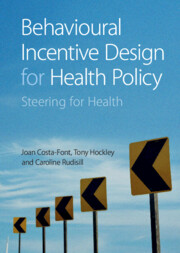Book contents
- Behavioural Incentive Design for Health Policy
- Behavioural Incentive Design for Health Policy
- Copyright page
- Contents
- Figures
- Preface
- Glossary
- 1 Behavioural Incentives and Health
- 2 Behavioural Learning and the Design of Incentives
- 3 Monetary Incentives for Health
- 4 Social Incentives for Health Behaviours
- 5 Nudging for Better Health
- 6 Social Preferences and Health
- 7 Behavioural Incentives for Health Behaviours
- 8 Behavioural Anomalies in the Demand for Health Care
- 9 Behavioural Anomalies in the Healthcare Supply
- 10 Behavioural Health Insurance Uptake
- 11 Ageing and Caregiving Decisions Over Time
- 12 Policy Applications from a Global Perspective
- References
- Index
11 - Ageing and Caregiving Decisions Over Time
Published online by Cambridge University Press: 18 May 2023
- Behavioural Incentive Design for Health Policy
- Behavioural Incentive Design for Health Policy
- Copyright page
- Contents
- Figures
- Preface
- Glossary
- 1 Behavioural Incentives and Health
- 2 Behavioural Learning and the Design of Incentives
- 3 Monetary Incentives for Health
- 4 Social Incentives for Health Behaviours
- 5 Nudging for Better Health
- 6 Social Preferences and Health
- 7 Behavioural Incentives for Health Behaviours
- 8 Behavioural Anomalies in the Demand for Health Care
- 9 Behavioural Anomalies in the Healthcare Supply
- 10 Behavioural Health Insurance Uptake
- 11 Ageing and Caregiving Decisions Over Time
- 12 Policy Applications from a Global Perspective
- References
- Index
Summary
This chapter discusses how time preferences influence the importance of and actions regarding old age health as well as factors behind taking up protective measures against the financial risks of care at old age. We discuss the complexity of planning for old age including the challenges related to our imperfect ability to predict the future or what our preferences for the future will be when making decisions today. We include the role of social norms and family experience in decision-making as well as the cognitive demands required of old age planning. We also incorporate the roles of biases such as optimism and present bias as well as risk denial and procrastination into decision-making about ageing. The chapter finishes with a consideration of nudges appropriate to this context.
- Type
- Chapter
- Information
- Behavioural Incentive Design for Health PolicySteering for Health, pp. 149 - 161Publisher: Cambridge University PressPrint publication year: 2023

